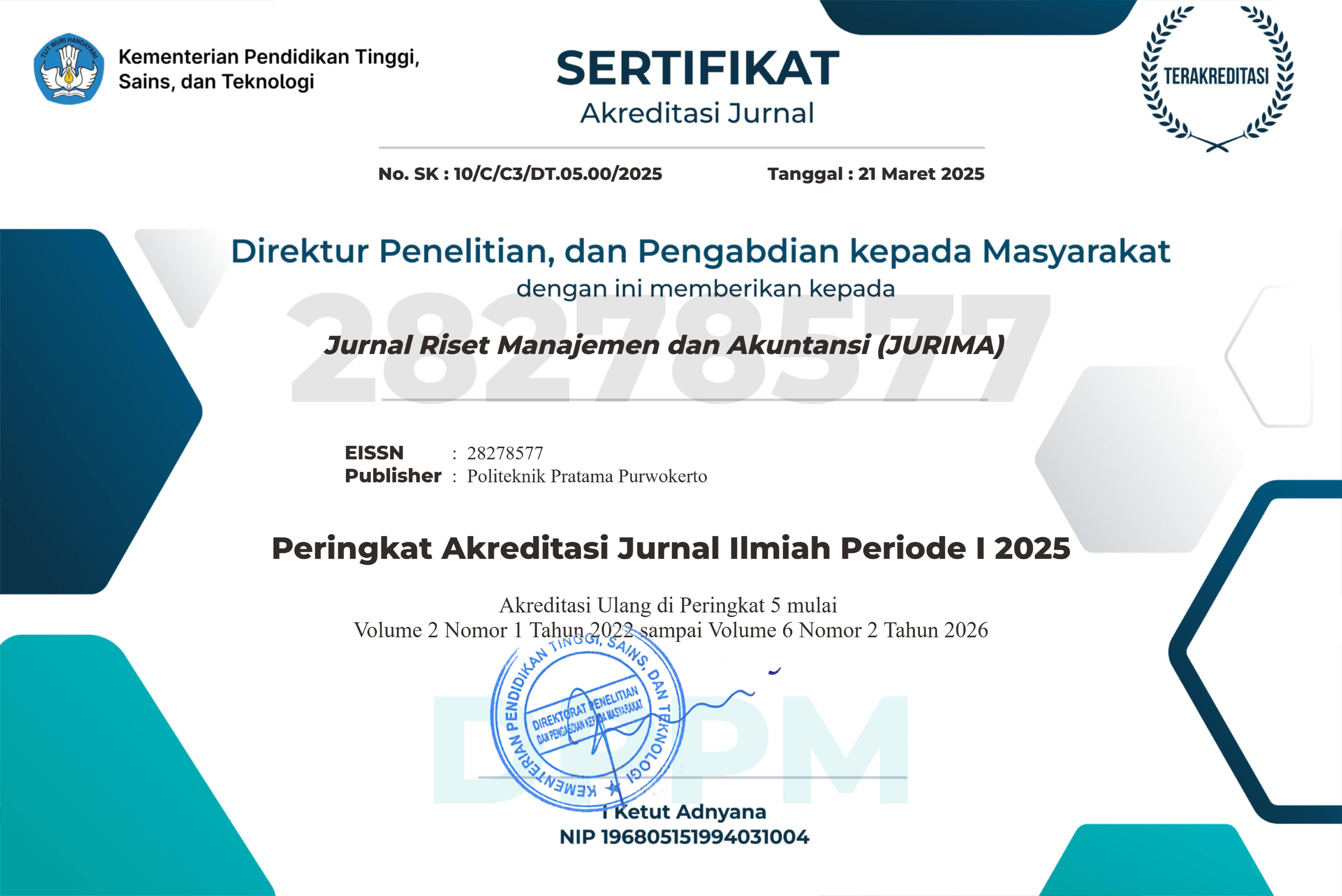Pengaruh Human Resource Development dan Work Life Balance terhadap Organizational Commitment pada Pekerja Generasi Z di Kota Samarinda
DOI:
https://doi.org/10.55606/jurima.v5i2.5244Keywords:
Human Resource Development, Work Life Balance, Organizational Commitment, Generation ZAbstract
This study aims to analyze the influence of Human Resource Development and Work Life Balance on Organizational Commitment among Generation Z employees in Samarinda City. Organizational Commitment refers to the extent to which employees have emotional attachment and loyalty to the organization where they work. The issue of low organizational commitment has become a major concern in human resource management, particularly among younger generations who are known for their dynamic nature and high expectations regarding the work environment. This research highlights how Human Resource Development practices such as training, mentoring, and career development, along with the implementation of Work Life Balance policies, can affect employees’ level of commitment to the organization. The study employed a quantitative approach using a survey method by distributing questionnaires to 111 Generation Z respondents working across various sectors. The collected data were analyzed using multiple linear regression with the help of SPSS version 27. The results show that both Human Resource Development and Work Life Balance have a positive and significant influence on Organizational Commitment, both simultaneously and partially
Downloads
References
Abhulimen, P. E. (2024). THE INFLUENCE OF INFORMATION-SHARING AND TRUST ON COMPETITIVENESS AND ORGANIZATIONAL PERFORMANCE IN CONSTRUCTION SUPPLY CHAIN MANAGEMENT. 15(1), 37–48.
Ananditha, K. R., Putri, D. G. M., Emilisa, N., & Chairunisah, N. (2023). Pengaruh Human Resource Development, Follower-Leader Goal Congruence, Work Life Balance, Dan Job Security Terhadap Organizational Commitment Pada Pns Di Kantor Polisi Wilayah Jakarta Selatan Kania. Jurnal Ilmiah Wahana Pendidikan, 9(18), 396–416. https://doi.org/10.5281/zenodo.8313966
BPS. (2023). Penduduk (Perkotaan) Berumur 15 Tahun ke Atas yang Bekerja menurut Kelompok Umur, 2022-2023. Badan Statistik. https://samarindakota.bps.go.id/id/statistics-table/2/NzAzIzI=/penduduk--perkotaan--berumur-15-tahun-ke-atas-yang-bekerja-menurut-kelompok-umur.html
Budiastiti, D., & Bandur, A. (2018). VALIDITAS DAN REABILITAS PENELITIAN. In Metode Penelitian Pendidikan Matematika.
Fajriyanti, Y., Rahmah, A. H., & Hadiyanti, S. U. E. (2023). Analisis Motivasi Kerja Generasi Z Yang Dipengaruhi Oleh Lingkungan Kerja dan Komitmen Kerja. Journal of Trends Economics and Accounting Research, 4(1), 107–115. https://doi.org/10.47065/jtear.v4i1.808
Gagola, A., & Susana, P. (2024). The Meaning of Work and Organizational Commitment of Generation Z Employees. 6(2), 309–317. https://doi.org/10.54783/ijsoc.v6i2.1141
Hardani, Auliya, N. H., Andriani, H., Fardani, R. A., Ustiawaty, J. U., Utami, E. F., Sukmana, D. J., & Istiqomah, R. R. (2020). METODE PENELITIAN KUALITATIF & KUANTITATIF. https://www.pustakailmu.co.id
Hutagalung, I., Soelton, M., & Octaviani, A. (2020). The role of work life balance for organizational commitment. Management Science Letters, 10(15), 3693–3700. https://doi.org/10.5267/j.msl.2020.6.024
Latupapua, C. V., Risambessy, A., & Tahanora, C. (2021). Pengaruh Work Life Balance Terhadap Komitmen Organisasi Dengan Kepuasan Kerja Sebagai Variabel Mediasi Pada Karyawan Yang Sudah Menikah. Manis: Jurnal Manajemen Dan Bisnis, 5(1), 52–64. https://doi.org/10.30598/manis.5.1.52-64
Marsela, G., & Sari, P. A. (2024). PENGARUH WORK LIFE BALANCE TERHADAP LOYALITAS KARYAWAN PADA GENERASI Z DI KOTA BANDUNG. 4(4), 2249–2262.
Ong, J. O., & Mahazan, M. (2020). STRATEGI PENGELOLAAN SDM DALAM PENINGKATAN KINERJA PERUSAHAAN BERKELANJUTAN DI ERA INDUSTRI 4.0. Business Economic, Communication, and Social Sciences), 2(1), 159–168. https://kemenperin.go.id/artikel/18803/Pertumbuhan-
Ramadhan, N., & Marinda, V. S. (2019). Pengaruh Work-Life Balance dan Kepuasan Kerja terhadap Komitmen Organisasi pada Ibu Bekerja Sebagai Guru PAUD di Kota Cimahi. JMK (Jurnal Manajemen Dan Kewirausahaan), 4(3), 205. https://doi.org/10.32503/jmk.v4i3.592
Rawashdeh, A. M., Elayan, M. B., Shamout, M. D., & Hamouche, S. (2022). Human resource development and turnover intention: organizational commitment’s role as a mediating variable. European Journal of Management and Business Economics, 31(4), 469–484. https://doi.org/10.1108/EJMBE-12-2021-0343
Rosita, E., Hidayat, W., & Yuliani, W. (2021). Uji Validitas Dan Reliabilitas Kuesioner Perilaku Prososial. FOKUS (Kajian Bimbingan & Konseling Dalam Pendidikan), 4(4), 279. https://doi.org/10.22460/fokus.v4i4.7413
Rumawas, W. (2015). The Impacts of Human Resource Development, Organizational Commitment, and Compensation on Employee Performance (A study conducted at Sulut Bank in North Sulawesi). www.ijhssi.org
Sahir, S. H. (2021). Metodologi Penelitian. www.penerbitbukumurah.com
Downloads
Published
How to Cite
Issue
Section
License
Copyright (c) 2025 Jurnal Riset Manajemen dan Akuntansi

This work is licensed under a Creative Commons Attribution-ShareAlike 4.0 International License.










